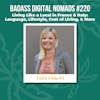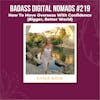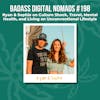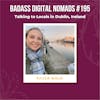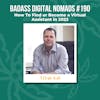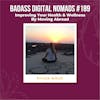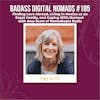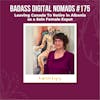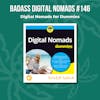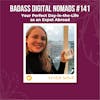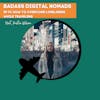Living La Dolce Vita: Moving To Italy and Experiencing the Local Lifestyle

An expat-turned Italian citizen shares her journey moving to Italy from Canada. If you've ever wanted to live "la dolce vita" in Italy but have questions about visas, residency, and the lifestyle there, this episode is for you!
An expat-turned Italian citizen shares her journey moving to Italy from Canada. If you've ever wanted to live "la dolce vita" in Italy but have questions about visas, residency, and the lifestyle there, this episode is for you! We're also giving you the real story about what it's like to live in Italy, including the pros and cons - what's behind the glamorized version of living in Italy.
Guest, Samantha Wilson, is the founder of Smart Move Italy and has helped thousands of people move to Italy.
You can join the Smart Move Italy Bootcamp for FREE here. It happens once per year (this year: September 12-14, 2023) and you can watch the recordings if you can't make it live. It's for you if you're curious about moving full-time or part-time to Italy. Over 7,000 people have signed up so far. Don't miss out!
Special Offers:
- Join the free Smart Move Italy Bootcamp
- Apply for Relocation Support from Kristin
- Check out SafetyWing Travel Insurance
Topics Discussed:
- Assimilating to the Italian culture and lifestyle
- Moving abroad with your family
- Residency options and real estate in Italy
- What to look out for when applying for residency in Italy
- How to get Italian citizenship by descent
- How to qualify for the Elective Residence Visa (ERV)
- Italy's Digital Nomad Visa
- Starting an online business after retirement
- Why foreigners leave Italy after moving there
- The 5 stages of moving to Italy
- Learning a foreign language
- Biggest cultural differences between Italy and North America
- Hidden gems and underrated vacation spots in Italy
- Italy travel tips and recommendations for a one week trip
Questions Answered:
- Why did you decide to leave Canada and move to Italy?
- How do you qualify for citizenship by descent in Italy?
- Does Italy have a Digital Nomad Visa?
- Where in Italy have you lived?
- Why did you start a business after retiring?
- Why do foreigners change their minds and leave Italy?
- How has Florence coped with the increase in tourism and short-term rentals?
- What are your favorite Italian foods?
- and more!
Episode Resources:
Related Podcasts:
- 194: Learning Languages Faster and Coping with Culture Shock in Colombia
- 216: Demystifying Expat Taxes: What to Know About Filing Taxes Abroad
- 219: How To Move Overseas With Confidence - Bigger, Better World
- 220: Living Like a Local in France & Italy: Language, Lifestyle, Cost of Living, and More
Related Videos:
- Italy Travel Tips & Vlogs (Playlist)
- 7 Things To Know BEFORE You Move Abroad
- 8 Reasons Why I DON'T Live in the USA
- How To Avoid Looking Like a Tourist When Traveling
Where to Go in Italy:
- Salò - Lake Garda (Lago di Garda)
- Cortona, Tuscany
- Verona
- Ostuni
- Puglia
- Pescara
- Borgo Rotundo
- Alberobello
- Lake Maggiore (Lago Maggiore)
- Bolzano, Dolomites
- Camucia
Other Resources Mentioned:
- Wait But Why
- Best Travel Clothing: Unbound Merino, Anatomie
Connect with Samantha Wilson:
Connect with Kristin and Support the Show:
See the show notes pages on BadassDigitalNomads.com or TravelingwithKristin.com/podcast for transcripts and more resources from this episode.
Sneak Peek:
Samantha: 00:00:00 I felt better and happier and healthier, not just 'cause I was on vacation. It was just the whole mood of it was what pushed us to leave and understanding of a way that, a new way of life, a new lifestyle, that there was something really quite different. And it's okay not to have all of the pressures. It's okay to prioritize your family and your friends and everything else will fall into place after.
Introduction: Welcome to Badass Digital Nomads, where we're pushing the boundaries of remote work and travel, all while staying grounded with a little bit of old school philosophy, self-development, and business advice from our guests.You know, critics of remote work say that you need meetings and face-to-face interaction in order to get things done, but we all know that communication and community are two of the most important factors for success in a location independent lifestyle. So every time you listen to an episode of this or any podcast that you find value in, I challenge you to share the wealth. Take a moment to think of one person in your professional or personal network who might benefit from listening in. Then share it with them and tell them why. Doing this will help you absorb and apply the info that most resonated with you from the episode, putting it into practice in your own life while delivering value to someone you care about. And with that, let's get on with today's show.
Kristin Wilson, Host: 00:01:37 Hi there, Kristin from Traveling with Kristin here and welcome to episode 224 of Badass Digital Nomads. If you are thinking of moving to Italy someday, then this is the podcast for you. My guest is Samantha Wilson, who is the leading relocation expert for people who are dreaming of moving to Italy. Whether you want to live there full-time, part-time or for a lifetime, she is the founder and chief dream maker of Smart Move Italy, the number one Italian relocation agency based in Florence, Italy. And today Samantha is giving us some insight into her experience of living in Italy, the struggles that her and her family went through when they were trying to move there from Canada, and also how they have assimilated into the Italian culture. She's gonna share with us some of the different residency and visa options you can have while moving to Italy. Some things to look out for during the application process.
Kristin: 00:02:47 And then at the end I pepper her with some travel in Italy questions to have her give us her favorite secret spots and vacation spots and recommendations for places to go that are very underrated and under the radar in Italy. So if you love Italy or if you're planning on going there someday, then I hope you enjoy my conversation with Samantha and happening this week. Actually starting today, September 12th, 13th and 14th, Samantha is holding a once per year Italy bootcamp that is free to attend. So if you wanna go even deeper into these topics on visas and residency lifestyle real estate, then you can sign up for her bootcamp for free using our link in the show notes and get some more information. So really was great speaking with Sam today. It's making me wanna go back to Italy and eat a lot of good food <laugh>. So I hope that you enjoy this as much as I did and I will see you on the other side.
Podcast Interview:
Kristin: Welcome, Sam to Badass Digital Nomads. And even though we are not a digital nomad, we have so many guests that are living their best lives in countries around the world. You are in one of my favorite countries right now, Italy, and it looks like you are doing just that. So where are you joining us from today?
Samantha Wilson: 00:04:19 Right now I'm in Florence, in beautiful Florence in the middle of this summer and we've just finished our last, hopefully our last heat wave. So it's still --
Kristin: 00:04:27 Oh, a heat wave. Well that actually sounds nice because it hasn't even been above 60 degrees Fahrenheit lately around here in the UK but Florence is actually one of my favorite cities. I went there the first time when I was 17 years old and it's remained one of my favorite cities to this day. So which section of Florence are you living in?
Samantha: 00:04:49 I live in the outskirts, well not really the outskirts. I live in an area called Campo di Marte, which is just sort of maybe a 10 minute walk into the Cattedrale to the center, which is really nice because most people think that Florence is, you know, just overrun by tourists, which it can be on sometimes. But there's, you know, the locals don't live in the center of town. They live just around the edges and there's lots of beautiful, very, uh, quarantine neighborhoods that you can enjoy and really live the same lifestyle here that you would anywhere else in Italy.
Kristin: 00:05:19 That's amazing. And who do you live with there? Are you by yourselves with a partner?
Samantha: 00:05:23 No, no, I'm married. We all moved. I brought my whole family, actually my husband and my son, my youngest son who's old now, he's in his twenties now. And then my oldest boy and my grandchildren even are moving here as well. So the whole gang is here.
Kristin: 00:05:38 Well, tell us a bit about your background. Where is your family from and why did you decide to move to Italy?
Samantha: 00:05:44 It's like 20 years, actually, we were talking about that about 20 years ago. I came to Italy for the very first time actually. I had lost my dad to cancer very quickly and he was just my everything. I mean he was the pillar of our home and our life and you know, when he died it just crushed all of us. And so my mom, I'm from Canada, so my mom and I said, let's just go somewhere and escape. And we thought, well let's try Italy. We hadn't been to Italy, we've been to Europe a lot. We lived in England. I'm a dual UK Canadian citizen. So we'd spent lots of time in Europe but never in, you know, in Italy. And back then, this is 20 years ago, we didn't have, we had internet of course, but we didn't have Google and Google Maps. And so it was really kind of more of an adventure 'cause we didn't know where to stay or where we were going.
Samantha: 00:06:30 We weren't able to pre watch YouTube of all of the videos of Italy. So we ended up in Milan and we drove up to Lake Garda area and the first night we stayed in a place called Salò, which is up in the north by Lake Garda. And we just, I actually, I just got a little goosebump I was talking about it because it still gets me. 'cause we couldn't leave where we were. We couldn't believe how unbelievably beautiful it was and the people and the food and the wine and just the whole vibe of it was just out of this world. So we went there, we drove around, we ended up down in Sienna, which we had no idea what Sienna was 'cause we weren't able to even look it up before we just end up there again. I opened this window, I remember in the hotel opened up to these red rooftops, you know what they look like in Tuscany.
Samantha: 00:07:20 Yeah. I thought what is this? And so I immediately went outside, went to an internet cafe, 'cause this is 20 years ago, went to an internet cafe and phoned my husband or wrote my husband actually, and said, get the kids come out, I'm not coming home. We're moving here at that time, this is 20 years ago. And he's like, oh this is great but no right, we can't be doing that. So I went back home and we came back at Christmas and then came back for years and years and years and eventually it took me, well I mean I always wanted to live here. There was no question that this was where I belonged for sure. And uh, and my husband was all for it and you know, my kids will just follow around. So that was fine. But we didn't know how to do it. So it took us a long time. Took us many years before we actually made the move.
Kristin: 00:08:03 And which city are you from? In Canada?
Samantha: 00:08:05 From Vancouver, from the west coast. Oh, okay. Yeah,
Kristin: 00:08:09 I love Vancouver. Well, going from Vancouver to Italy, it's like two of the best places in the world to live. Yeah. But was there anything about your lives in Canada that you wanted to change? Or was it just that you were enamored by the scenery and the people and the culture in Italy?
Samantha: 00:08:28 I think when you come to Italy, if any of your listeners have been here before, they know when they come here it changes them. I mean even just a very short trip. But you've been here, you probably can relate to it too. You start to question how you live and what your priorities are back home because you have to follow those priorities when you're back home. And, and I did the same thing and when I went back I was super happy. I've got lots of friends and family. I had a great life in Canada. Nothing wrong with it, but you know, I felt better and happier and healthier and not just 'cause I was on vacation, it was just the whole mood of it that, you know, was what pushed us to leave. And I mean Canada is great. I love it. Um, all of my friends are still there.
Samantha: 00:09:09 And one of the things I was worried about is when we left I thought geez, you know, am I gonna see everybody again or where's my family? You know, am I gonna see everyone? And what it turns out is that everybody, you have all of a sudden a whole lot more friends than you thought you had <laugh> and all of a sudden you have a place in Italy 'cause everybody wants to be here. So it was just the overall understanding of the way that a new way of life, a new lifestyle, that there was something really quite different. And I always equate it to, I think Italy gives you permission to be human here. I always find it, to me it means I'm okay to take a, it's okay to take a holiday, it's okay not to work all day and all night. It's okay not to have all of the pressures. It's okay to prioritize your family and your friends and everything else will fall into place after you're seen here and heard here. You're not just someone getting by.
Kristin: 00:10:00 Yeah, definitely. I feel lucky to have gone there as my first overseas trip because it really did open my eyes to different way of living. But I also felt all of a sudden like I was living in the magic and this magic is everywhere in the world. It's probably where we're all from, you know? But it's just something that clicks when you leave a home for the first time and you go somewhere that's very foreign to you when it's like almost like going back to being a baby or a little kid. Just everything is so new and different and your senses just feel so alive. And I can still remember my first taste of Italian espresso and the sounds and the sight of being inside that coffee shop and how busy it was when I got there to Rome, <laugh>. I remember the first panini I ate, which was in this courtyard outside of the Colosseum, like the gelato, my first taste of house wine that just was made by the restaurant, my first arugula salad, like all of these amazing foods that they have in Italy.
Kristin: 00:11:05 It's like you remember vividly those experiences. Whereas you know, <laugh>, I can't tell you how many, you know, things I've eaten in the US I'll never, they're not memorable, let's put it that way, <laugh>. So I think everyone can relate to falling in love with the place and maybe even in some way going to these places makes you appreciate other things about home as well. But talk to us a little bit about this process of moving to Italy because it's not the easiest country to move to. So what was your thought process when you and your husband first decided this is something that we wanna do and then what are the different options and categories that people can qualify for a way to stay there long term?
Samantha: 00:11:53 Well, Italy is a complicated country for a number of reasons. They have a notoriously a very famous, notoriously difficult bureaucracy, which is probably the one thing that you know, we would say is really horrible here. I mean it's truly what you can imagine, what you think it's bad just times it by 10. It is really, really difficult. Now, when we moved here many years ago, the issue was more, there just wasn't a lot of information. I mean there wasn't services to help you, you had to sort of figure it, well not so you had to figure it out yourself. There was very few, you know, English is not a big language spoken here. So when you didn't have the language, it's a real big challenge. Now, however, moving to Italy it's not easier. But there is help of course to help people get through. But really what happens, your first thing, if anybody is thinking about moving to Italy, the very first thing they have to think about, which we didn't have to because we were British Canadian.
Samantha: 00:12:47 So back before Brexit, this was part, Italy is part of the European Union. So we could move here freely without a visa. But the very first thing people have to consider when they're moving here or thinking about moving here is a visa or how are they gonna live here legally because it's immigration. So if they can't live here legally, then nothing else really matters. Then they have to choose part-time living here. And this is probably an area that is the most misunderstood because there's all these old romantic books and you know, Italy is glamorized in the media everywhere. So people have a false sense of what it really means to move here, what it takes, you know, you can't just move to Italy and write your novel or paint your picture or create your life. You have to really become an immigrant <laugh> and you have to start the whole process of immigration into Italy. And that isn't always so easy.
Kristin: 00:13:38 So one of the popular ways that people go there, let's use the US as an example because we have a lot of listeners from the US and there's actually a lot of people that are looking to get their Italian citizenship by descent. So yeah, let's talk about that for a moment because that's like the holy grail, right, of being able to get an Italian passport. And you can do this from any country. So you know, let's say you're born in Malaysia but you have a relative that's from Italy, you can apply for Italian citizenship by descent. Is that something that at smart move Italy that your team helps with? And do you have any tips for how to apply for that cross?
Samantha: 00:14:23 Sure, yes we do. We have a whole in-house citizenship division actually. So we help people with their citizenship, whether it's through bloodline, which is your sese. That means that, here's the thing, you can only be Italian if you are born to an Italian. So this is the big idea. You can go back as many generations as you need to. It's actually quite generous. You can go way, way, way back. As long as Italy was Italy at the time. So often people go to great great grandparents, several, you know, generations remote. But what we have to prove is that the line, the bloodline was never broken before the next generation. And the way a bloodline is broken is through naturalization. So for example, it was a huge migration in the early 19 hundreds from Sicily, Naples from the southern part of Italy to the US. And what happened is, is the Italians went to the US to settle up and try a new life and they often, the men usually only often naturalized.
Samantha: 00:15:23 So they became American citizens to have all of the rights and the benefits of becoming an American. And then they had their families and they, you know, raised their families in the US. If the Italian ancestor became an American before the next generation was born, that next generation was technically born to an American citizen, no longer an Italian. However, if that Italian never became American before the child was born, the child is technically born to an Italian and therefore you can get your citizenship. There's lots of ways that you can apply for citizenship. I'm not gonna go into all of the details 'cause it goes on and on and on. But one of the biggest problems, I'll tell you what people are having, I mean documentation, if you take this idea that Italian bureaucracy is horrific, it even translates to the consulates in your local, you know, jurisdiction.
Kristin: Oh yes.
Samantha: 00:16:16 And you can only apply for citizenship in the jurisdiction from which you reside. So if you're in the US, you have to apply at your consulate, which can be years of waiting down the road or in some cases you can apply here directly in Italy, which is super fast. But you have to move here to do that, which is not so easy for some people. And then in some cases we go to court, we move the jurisdiction to the courts in Italy. But you know, there are thousands and thousands of people that look for their Italian citizenship. And to me it's like winning a lottery because not only does it give you the right to live here in Italy, but it opens the door to the entire European Union. So if you wanna work, move, live, go to school, do whatever you want in any European country. And that's part of the Schengen. I mean this gets you in,
Kristin: 00:17:01 It's a lot of Yeah. So you can help people determine their eligibility. Oh yeah. Essentially before going through this whole process,
Samantha: 00:17:08 Of course we have little quiz. I mean it's pretty quick and easy to figure out if you qualify, whether or not you can prove it is the hard part, right? That's what takes time. It can take over a year to get your application ready just to apply.
Kristin: 00:17:20 Oh yeah, I started with that as well because my grandmother's family immigrated from Sicily through Naples and she was the only child to be born on US soil. So I think what happened was that her parents were naturalized before she was born. So the rest of my family can get citizenship from their side, but I can't because my grandmother was the youngest child. So she was born in Philadelphia.
Samantha: 00:17:51 Right. So the line broke. The line ended.
Kristin: 00:17:54 Yes. Although I did read something at the time that it was like if she was a male then it wouldn't have been broken maybe.
Samantha: 00:18:02 Well it really depends what you're talking about probably is in 1948 case petition. So when the line is passed through the women, through the female, we have to move the jurisdiction from your home country to here to Italy. And there's a lot of rules and laws and timelines in there that we have to take a look at. But I mean certainly if you have your dates and your numbers, send us an email and I'll take a look and you know right away,
Kristin: 00:18:24 Okay, yeah, we'll see. Yeah, can't hurt. So yeah, we'll definitely link to everything. And another really popular one is the elective residents visa. So this is primarily made for retirees that can show proof of recurring passive income or a pension to be able to live there. What are some other things that people should know about that to see if they could possibly qualify for it?
Samantha: 00:18:50 The ERV, Elected Residency Visa is a visa that is, like you said, for retired people. So this is a visa where age matters for us old age. I mean this is where <laugh>, this is where it's good to be old, the younger you are when you try to apply for an ERV to convince the consulate that you're never going to work because this is a big requirement. I mean it's a number one requirement. You cannot ever work anywhere. Not as a digital nomad, not online for a company somewhere else. You can't write a book and sell a book. You can't do any of this. You literally have to sit in a piazza and enjoy your days as a retired person. So if --
Kristin: 00:19:24 or sing it
Samantha: 00:19:25 Yeah, Yeah. So if you are a younger person, right, that isn't sort of of retirement age and you're applying for an elective residency visa, even if you have the passive income in some way to qualify you, there's still a lot of question marks to get through. And the consulates are, they're getting harder and harder to get the ERV. It used to be sort of a more simple visa for retired people to get, but it's quite challenging. And some of the consulates, you know the rules, they aren't really changing the rules, they're just really tightening them up a little bit or expecting some pretty significant passive income and passive income. I'll tell you really quickly how to determine what passive income is. 'cause this is the only income that qualifies if you are back to sitting in the piazza. If you move to Italy and you sit in a piazza and drink your favorite beverage and just watch the day go by, never answer an email, never pick up the phone and never talk to anyone. Will the money that we're talking about arrive in your bank account every single month and every single year with you doing nothing? And if the answer is yes, that's passive income and you need a lot of it, you need in between 3,500 euros net or usually more closer to four or 5,000 euros net a month. So it's pretty high
Kristin: 00:20:41 Uh, and that can allow you to stay. Is it five years start?
Samantha: 00:20:47 No, actually because a visa, I just wanna explain the visa 'cause this is also what people are confused about. A visa is really just the key to unlock the door to Italy, that's all it's 'cause Once you come into Italy with this key, then you have to apply for a permiso de adjunto, which is your permit to stay and your permiso de adjunto for an elective residency visa starts at one year and then you have to renew every year over till about five years. Where if you want, you don't have to, but if you want you can apply for an EU long-term permit, which keeps you there for another 10 years and continue to reapply for that. But you need that visa to get in the door because otherwise you've only got eight or 90 days here. So an ERV for example gives you 365 days to get all of that business done in order to get your permit to stay. Once you have your permit to stay, the visa means nothing.
Kristin: 00:21:35 Right. And then I had a client, she applied for it before the pandemic, but was then declined because she didn't have the right lease agreement. So there's a lot of little fine details that can be very boring. We won't get into them more on the podcast, but just, you know, things for people to think about. And she just told me that in a call about a week or so ago, uh, that she was---
Samantha: 00:22:01 The big takeaway. Yeah, I do a lot of ERVs. We have an RV lab, we do lots of stuff like this. The big thing to think about with an elective residency visa is do not underestimate. It is not an easy visa to get and follow the rule or the list of documents precisely exactly what the consulate asks for. Don't assume anything.
Kristin: 00:22:20 And even sometimes what they don't ask for, well yes, some other things.
Samantha: 00:22:25 Sometimes people
Kristin: 00:22:25 Don't overload.
Samantha: 00:22:26 Yeah. And sometimes people freak out, they overload, they put everything in the kitchen sink in their application and then you annoy the consulate. So just give them exactly what they ask for. If they want more, they'll ask you for it, but never give them more. And always, always, always. I'll say it one more time 'cause it's very important. Always exceed the financial requirement. Always do not think you're gonna get there on the minimum. 31,000 euros. It'll never happen. Now, I mean at the time of this podcast, it could change in the future but right now, you know, at least minimum, minimum 40,000, 45,000 a year per person.
Kristin: 00:22:59 And now Italy has the digital nomad visa where this is where you can work. Is that a fully approved and operational yet or do you have any insight or tips on that?
Samantha: 00:23:11 Yeah, unfortunately not gonna happen. I hate to break it tenfold. I hate to, it's not canceled, it was put forward, but it was more of a political statement than anything really. And this new government doesn't care anything about the digital nomad visa. The way that a law like that or a immigration piece passes through Italy. It goes through several stages. And I'll just give you a real, I'm not gonna tell you about the politics, but I'll tell you just one little way so you can understand it. When it came down to after this digital nomad was proposed and people went, yay. Yes, do it. You know, the one Audi did.
Kristin: 00:23:43 Yeah, we've been waiting part since 2020.
Samantha: 00:23:46 No, I'll give you some good news about it, but let me tell you why it's not gonna happen. At the end of the day, what they needed was three different opposing political parties and one sort of administrator to all agree on all of the points. This is Italy, it's just never in a million years is this gonna happen. So we had actually betts with our immigration team when the digital nomad visa, when all this, you know, wrestling was going around how long it would take, if it would ever take, and I lost. But our head immigration guy, he said never in a million years. So we don't think it's gonna come forward at all. But I can give you some good news about it because Italy has a self-employment visa, which is similar to digital nomad and how the digital nomad visa was written in law. Anyway, the proposal, it would've been even harder to get than the self-employment visa. So it wasn't this golden ticket to move to Italy and write your novel at all. It was actually gonna be incredibly difficult and only for very highly skilled people. And there is already a visa for that. It's called the EU blue card visa. So it's not really the be all end all. There's other ways.
Kristin: 00:24:50 Yeah. I don't know why so many governments created this visa and then made it harder to get than among the ones that they already had. So, but that's a--
Samantha: 00:24:59 It's a really popular term. It's a lot of attention.
Kristin: 00:25:03 So you've been living in Italy now, what year did you officially move over there?
Samantha: 00:25:08 2050.
Kristin: 00:25:09 And was Florence your first choice of a place to live? Or have you moved around a little bit over the years?
Samantha: 00:25:16 Well, when we first here, I mean we've had a house here for many, many years, but full-time living here. 'cause we were lived in England first. I mean we moved over to Europe a long time ago. But it took us a while to get to Italy 'cause we couldn't figure it out. So we sort of hopped back and forth and had a house here. So our first real residence here was in Cortona, which is under the Tuscan Sun. Absolutely beautiful. And we have a farmhouse there, which we love very much. And then we also have an apartment in the city in Florence. I love Tuscany. I mean I love a lot of regions in Italy, but Tuscany is kind of my thing, probably because this is where, you know, remember I said I opened the windows in Sienna, this is where I sort of connected to. And you know, my team all over my company, my team is all here in Florence. So it just makes it easier.
Kristin: 00:25:58 And were you working when you first moved here? Or how did you decide to open this company?
Samantha: 00:26:06 No, I came here, retired Kristin. I came here and to sit in the Piat and, and watched the day go by. This is ice. I mean that really was my goal. And what happened, we have a couple of apartments we still do in Cortona that we rent out for tourists. And several years ago, maybe 2013 or something, one of my guests who is lovely, we sat down. She was actually could qualify for Italian citizenship. I knew nothing about it back then. We went for a glass of wine and she said, Hey, how did you move here? Like how did you do all of this? So I told her and we had a few glasses of wine and she said to me, you know what, you really should do this. People would really have a lot of information. People would, 'cause I had to learn a lot to move here, right?
Samantha: 00:26:46 So I had all this information and she says, you really, people need your help. And I thought, all right, uh, who would do that? Who needs the, he can't. People just find it themselves. And then one thing led to another with one of the biggest sort of helpful Facebook groups, how to move to Italy on Facebook. It started to blow up and expand. And so we started to, you know, grow the business that way. Now we're national. We have two companies. We have a fully licensed real estate company as well as our smart move, Italy Consulting. We help with literally everything except for helping people find work. That's the only thing we don't do. It's easier to say that. Yeah,
Kristin: 00:27:20 I know. I don't do that either. And is your husband working with you or is he retired or does he do No,
Samantha: 00:27:25 He was supposed to be retired too. Yes, but I roped him in actually everybody, we have a lot of employees too, but everybody in my whole family and my son's a digital creator. And I mean, everybody does something here. So it's all a big team. So yes, he does.
Kristin: 00:27:39 Oh good. Yeah. I love your branding and everything. So they're doing a good job. But when you first got to Italy, your kids were still in school, correct?
Samantha: 00:27:48 Oh, old. Remember I came here to retire. Well, not that old, my youngest--
Kristin: 00:27:52 You look so young.
Samantha: 00:27:53 Yeah, no. Oh, this looks kind of lighting. Do I have any here the oh, we would see Italian food. It's wine. It's the Italian wine. I'm just preserving myself. And--
Kristin: 00:28:00 The fountain of youth
Samantha: 00:28:01 <laugh>. That's right. My youngest boy at the time was 17, 18 and he came at that time. ]Just finished up school.
Kristin: 00:28:09 And was that one of the reasons that you waited? Did you wanna make sure your kids were graduated and off to the workforce or off to college or
Samantha: 00:28:17 No, <laugh> my poor kid. No, you know, I mean you can learn from anywhere, right? No, it wasn't. In fact, we traveled a lot while he was in school anyway, I really believe in that. You know, when he was studying the Treaty of Versailles, I took him to Alice at Versailles so he could actually see it. So I mean it's a different way of learning. So no, his school unfortunately, you know, it's not something that was on my mind. Honestly what took me so long, my husband still had to retire. And that took a while to convince him to leave his work and retire early. We had mail one day because I've been bugging him to move. And we had mail and I got his early retirement letter and I'm like, oh, that's it, you have to go now we're leaving now. And he didn't want to leave. It took a while. And then he said he watched a commercial on TV that, I dunno what it was advertising, but it said you only have 80 summers in your life. And he said it just was like a switch went off for him. And he said, okay, we're out of there. We're going.
Kristin: 00:29:10 Oh my gosh, I never thought about that. But it's true. There's this website called Wait, but Why with Tim Urban, he's a blogger and he made this very viral post that has your life in dots or something. Yeah. And it shows every week in a dot and can fill them out. So you know how many dots you potentially have left. It's a bit of a morbid thing. Yeah. Kind of like the stoics with their memento Maury of way of approaching life. But it is good to get that reality call and jump into action sometimes. And you know, we're not getting any younger.
Samantha: 00:29:49 And you know what, the thing I always say about people, whether they're moving to Italy or England or wherever it is, if they plan to make a big move, is you're not in jail. Right? I mean, if it doesn't work, it's okay. You try. I really believe that it's worse if you don't try. There's more regret if you don't try than if you do try.
Kristin: 00:30:06 Yeah.
Safety Wing
Kristin: 00:30:11 Kristin here, if you're thinking of going to Italy or traveling anywhere in the world, then you need emergency travel, medical insurance with Safety Wing Nomad Insurance, you can buy a policy before you leave home or while you're abroad at any point of your journey. They offer flexible plans that start at $45 and 8 cents for a week. So you can subscribe to continuous coverage throughout the year when you're traveling to multiple countries. Or you can also just do it month to month or on a per trip basis. Safety Wing's plans cover you if you're in an accident or if you get sick and need medical assistance abroad. And they also cover you for travel delays, loss check baggage, natural disasters, liability and more visits to your home country are also covered for every three months abroad. You're covered for visits back home for up to 30 days or 15 days. For us residents find more information on Safety Wing insurance by using our link in the show notes.
Kristin: And have you seen, among people that have moved to Italy and then decided that it didn't work out for them because it's not gonna work out for a hundred percent of the people. So have you met any Canadians or Americans or other foreigners that have moved there and then changed their minds because they got through that romantic facade?
Samantha: 00:31:48 Uh, Honeymoon Italy
Kristin: 00:31:49 Is on one hand, but also it comes with a, a lot of other challenges and problems in the country.
Samantha: 00:31:58 I would say that on average, I mean, I don't know every expat that's moved to Italy, of course, but most of the time most people go back. Eventually they go back because they often don't just completely transfer their lives here. They've always keep sort of one foot in their home country and then one foot in their new country. And the reason, typically there's a couple reasons, but the biggest reason really is they can't get over the inconvenience of living in a foreign country, especially Italy. It's just not an easy country to live in because of all of these steps. I mean, if you get one thing done, even after many years in Italy, if you have one thing done a day, you time to celebrate. So this becomes tiring after a while. And just the things in life that you're been sort of grown up with and used to in your life, they're not here anymore.
Samantha: 00:32:44 So life is a little bit harder, a little bit more physical, a little more do it yourself. And language is a problem for most people here. You know, there's not a lot of, a lot of it times do not speak English. So there's always this feeling of being outside and never really feeling like you're fit in. And I'll tell you, when you move to a foreign country, and I'm sure a lot of you're listeners 'cause wherever they are in the world, you have this new sense of appreciation for the people in your home country that were immigrants for sure. Because you feel all of a sudden what it's like to not really get it and not be part of something. And this is usually just becomes too much for most people. This comfort of knowing everything. And when you said earlier, you're like a baby, I always tell that to people, you are starting brand new. I mean really like a baby. You have nothing, have no credit score, no history, no reputation, no nothing. You can't say I'm a lawyer 'cause nobody cares. <laugh>, you know, you can't say all of these things. You truly have to get out of yourself and out of your ego. And if you don't, you won't last. That's usually what happens.
Kristin: 00:33:47 Yeah, it takes time to put down roots somewhere and to get to know people and for them to get to know you. And if anyone listening went somewhere new during the pandemic, you might have noticed how that played out over those years. Because going from being in a very traveling lifestyle to then stopping during the pandemic, I created a whole new community in Miami, Florida where I had never lived before. And even now, three years later, people I'm still connected with on Instagram and social media, it feels like they're just starting to get to know me. It's weird because you know yourself so you know who you are in your hometown. And then when you go to these other countries, you don't realize that you are a complete stranger. And it takes some time for people to see beyond just, okay, this is a tourist or this is a foreigner, and really get to know you.
Kristin: 00:34:45 And sometimes it can be a bit unsettling because someone will make a comment or say something and you'll realize they actually have no idea who I am as a person. You know, they might think in my case they're like, oh, this blonde girl, blah, blah, blah, whatever. Or the people who know me from the music industry, oh yeah, this girl, she's a DJ or whatever, and you wanna be like, no, but I have so much more <laugh>. Yeah, so much more to my personality. And you take for granted that your friends from your hometown, you know, they know what your hobbies are. They knew you had this business for 10 years, they know your parents or your grandparents or your siblings. They know stories about you and those kind of shared experiences. You are starting over when you go somewhere else.
Samantha: 00:35:29 And then, so you add a language element, a difficulty in communicating and it makes it even worse. You, I, I dunno if you've ever watched Modern Family, but there's a a, a little cliff. I love it so much. And it's Gloria, she keeps saying stuff and they're making fun of her and she gets really mad and she says, you have no idea how smart I am in my own language. And it was such a great comment because I know that that's the frustration that people feel. 'cause you really are treated kind of stupid because <laugh>, they don't know what you know and people can't communicate with you. But you know, one of the things that we're doing, which we're finding because there's five stages to moving to Italy, to moving to anywhere really. And the final, you know, it's from learning to evaluating to applying and arriving and then finally settling in is your last stage.
Samantha: 00:36:10 And so we have a lot of people in our community and our membership that are here in that stage. Right. They're in that settling in. And you talked about the honeymoon and that's starting to go away a little bit. It's been a year, a couple of years. And what we're doing actually this year, because I think it's really necessary, is we're bringing in, in our, in our memberships and in our groups, we're having therapists, behavioral and cultural therapists that in a very easy way, not like a big therapy session, but in a very light and easy way to talk about those feelings of maybe reality versus your dream. And my goodness, I moved to Italy and why every Sunday morning am I not having this long table full of all Italians laughing and eating lunch all afternoon and I'm just sitting at home watching Netflix instead.
Samantha: 00:36:54 You know, like what is these challenges that I'm facing? So I think what has come about, what we've learned is that people have this anywhere they're moving, they have this disconnect between what they think they're gonna have and what they hope they have and what the reality is. And it's very difficult. And if they come as partners and are married, there's often it's one person's real dream and the other one tags along and doesn't go right. You might have some problems in there too. So people need to take, they focus so much on the bureaucracy and so much on the, how do I get my promessa? Where's my visa? And all of this stuff, right? But they don't pay any attention to themselves and their mental health and their ability to adapt to the culture and how that makes them feel and their loneliness and all of these things are incredibly important. If they don't pay attention to those, they will leave. That's just the way it's.
Kristin: 00:37:44 Yeah. Did your entire family learn Italian?
Samantha: 00:37:47 Yeah. You know, it's a work of progress. We all speak it in different levels and different ways. But you have to learn language, you have to learn to communicate. We tend to speak mostly English in our business because all of our clients are English. So all day long all we're doing is speaking English to each other and to our people and our communities. But our friends are all Italian. So there's this mix between.
Kristin: 00:38:11 Did you learn by just being in that environment and immersing yourself there? Or did you take school and classes?
Samantha: 00:38:18 I've taken parent approach every class, this stuff. How do you have taken every class you could imagine, you know, language when you're younger. I think it's easier when you get older. It's hard and you get busy and you get tired and it's really a brain exercise. I mean you have to learn addicted to coffee. Yeah. Trying to learn. Trying to learn Spanish. Yeah, well, trying to learn the languages. Then you realize you have to relearn English because you forgot what a pronoun was. Right. And then you're think, what do you want about? So yes, I still do. I mean I still study a little bit. I still try to talk. I get lazy for sure. And I prefer to speak in English at times 'cause I'm slightly impatient. So I wanna get things done a lot faster. But yeah, I mean, you know, the goal is, is to just keep trying and not be so hard on yourself. People get really hard on themselves. It takes time.
Kristin: 00:39:00 Yeah. And it's a big ask. I mean it took us years to learn our own language before we ever said our first words. So we gotta give ourselves a break. What do you think are the biggest differences in the culture between Italy and North America? Or you know, US and Canada in particular? We talked a bit about the bureaucracy, we've talked a bit about the appreciation of life and kind of this low pace of life and being human. But what are some of the other things that people should be aware of, you know, beyond just the glossy image of going to Italy for a vacation or your honeymoon?
Samantha: 00:39:38 I'm thinking of more of, of a myth to what the reality is as opposed to maybe the differences between, maybe it's a little bit of both. The idea is when you're here on a vacation, and I know you've experienced the Italians, you cannot believe how kind and accommodating and you know, the hospitality here is so great. And I can tell you that the difference between service in Italy and service in North America is starkly different. They're kinder in Italy. Without question, without question. And this will happen. This will continue on for as long as you're here. For as many years as you're here, you'll still be shocked at how kind and actually caring the Italians are to you. However, your definition and North American definition of service is not the same as the Italian one. And I think that gets most people into kind of trouble because you are not the most important thing to a business in Italy.
Kristin: 00:40:33 The customer can be wrong.
Samantha: 00:40:35 Oh, who caress it's lunch. I don't care what you want, but I wanna come in and buy your thing. And you know, no, I'm going for lunch. You can come back later. We're closed all afternoon, it doesn't really matter.
Kristin: 00:40:46 So people are still closing in the afternoon. Because somehow, I think, you know, in 2023, maybe everyone's just opening again. Like I'm asking why the US
Samantha: 00:40:54 but why, why, why open?
Kristin: 00:40:57 Well, no, I know. I think with technology and kind of the exporting of the American mindset of capitalism and keeping businesses open longer, I was just curious if that has been seeping in where now I notice here in the UK, like you can actually get things delivered later and at night
Samantha: 00:41:17 And UK is --
Kristin: 00:41:18 Things are open like not as much as the US but still a lot. But it's not happening in Italy?People are still taking their--
Samantha: 00:41:24 Sure, yeah. We just closed for Ferragosto, which is August holiday. I mean every single thing is closed, not everything, but almost every service business is closed for sure. Hotels and restaurants, obviously not. But no, you just closed for two weeks and, and what you learn very quickly, and I tell you it was hard 'cause I came from, you know, north America where you're open all the time and you have to be available. And customers always first you, oh my goodness, what if you lose a customer in a sale? 'cause you didn't answer the phone here. What you realize very quickly that they'll call you back and that everybody else is closed as well. So there's not this, again, it's this prioritizing of life of what really truly is important. The principles of, you know, the Italian lifestyle is about, one of the major pillars is about rest and balance.
Samantha: 00:42:07 And you cannot be really good at your job if you do not rest. And you cannot be really good at your relationships if you don't spend time in them. And the Italians embrace that and they, you are allowed to take that time. It's completely permissible. As a matter of fact, if you work so hard, if you're one of, and there are some Italians that really wanna go, go, go, they have this same mindset, this North American mindset, but they really stand out and it's really not appreciated here at all. It's like, this person's crazy. He needs to have some wine, he needs to relax. What is he doing? And it's not changing. Even cities, you know, in Florence through Ferragosto, through August break, many, many stores are closed for the holiday. They're just gone perfectly fine.
Kristin: 00:42:50 Do you feel like you and your family have assimilated more into the culture having been there for so long now? And do you also feel accepted?
Samantha: 00:43:02 Yes. As a matter of fact, we go away, we go to Greece every summer. We, for our Fargo, we go eat some Greek salad and fetta cheese. So we were just in Greece a couple weeks ago and people always ask, where are you from? And we always used to say, oh, we're Canadian, or you know, we're from Canada, but now we don't. We say we're from Italy, my husband was blonde, so we just not look at all the town. But you know, this is our home. I can't imagine ever living really anywhere else. This is, we really is what we do here as far as fitting in. Yeah, we have a core group of friends, a core group of family. We have Italian friends who have become literally like brothers and sisters and very, very close, closer really than I've been to many friendships in my life. It's a different bond here. And you know, do you feel like an outsider? Sure. Because you are always, what's we call it a straniere, which means a stranger, a foreigner, we call it straniere, here. There's a couple of you. And no matter where you go, you will always be a straniere. You may speak Italian, you may have you sitting around a table of Italians, but you are the foreigner in the group. So this will always be. Mm-hmm. But once you accept that, it's not so bad.
Kristin: 00:44:10 Yeah, that's true. I think I've been that person many times.
Samantha: 00:44:14 Yeah.
Kristin: 00:44:15 And You're not gonna change what you look like. You're never gonna change your roots or where you're from. Yeah. Oh we really want to. 'cause that makes you who you are. But it's good to know that the locals have embraced you as one of them, even though they acknowledge that you're still from somewhere else. I'm also curious about, so you mentioned you have
Kristin: 00:44:36 A home or a couple of properties in Tuscany and also in Florence. Can you give us some insight into the real estate market there as far as you know, the value that you get for your money and also the purchase process?
Samantha: 00:44:52 Sure. One of our companies is a fully licensed estate agency. So we work in this area all the time. Real estate in Italy in general is pretty good investment. It's not an investment that's gonna grow really quickly and flip and sell and make a ton of money. It's just state, Tuscany is expensive because it's for premium. I mean it's a premium brand. Just the name in itself is a premium. So you're gonna pay about 20% more to live in Tuscany. Where if you go just a little bit across the border to Umbria, which is just next door to Cortona, if you're in Cortona looks the same unless you're from Tuscany, <laugh>, you can tell it's Umbria. But otherwise, you know, and you'll spend 20% less. So market-wise, we're starting to see some changes in cities like Milan and Florence and Rome and the bigger cities for sure.
Samantha: 00:45:36 Ostuni in the south is becoming very, very popular, which drives the prices up. But generally the prices in Italy are far less than what you're going to spend, you know, in the US for sure. You can still get a pretty nice decent property in some beautiful little towns and cities for, you know, I had one client that said this is the price of a boat slip in Miami. So, you know, I mean it was a great comparison, but again, you get what you paid for. So these, you know, I just did a BBC travel show and we were talking about in the south and property, and there's this myth that you can get these amazing places for a Euro or 10,000 or 20,000. It isn't, it isn't true. I mean, sure you can buy something if you want to for a Euro or 10,000, but it's going to cost you a fortune to fix and there's gonna be all kinds of problems. So you still get what you pay for. Is it less than what you'll probably pay in your home country? For sure. And you'll get something pretty gorgeous. Is it gonna make you as much money as your home country? Probably not. But it's not gonna go down either. It's usually not gonna depreciate. It's gonna probably stay pretty stable and you get what you pay for. So low cost home is low value.
Kristin: 00:46:44 Florence has been a hotspot for tourisim for, I don't know, thousands of years probably. How have they coped with this change to Airbnbs and private vacation rentals? It seems like this concept of the short term rental is wreaking havoc across the globe, but is it that much of a problem in Florence or how have they balanced out this seasonal tourism with having locals that are living on the outskirts of the city, but also having, you know, hotels and vacation rentals and more expensive properties in the center?
Samantha: 00:47:24 Yeah, so you're talking about rental as opposed to purchase. So Lawrence in particular, just recently, a couple months, maybe not that long ago, passed a law that they weren't giving out, not a law, but they decided, the mayor decided that he wasn't gonna give out any more licenses for Airbnbs in the city of Florence in the centro in the center park. You know, you can get them in different areas, but not in the center because you know, it was driving prices up and it was not necessarily flushing out locals, but it was getting to that point. I mean, a lot of locals don't live in centro anyway. They live on the outside of it. But there are, we're starting to see Florence, Milan, Venice for sure starting to see some restrictions because of the over tourism. So if you're coming here to be a renter, and a lot of people like to be renters because it's less commitment, right?
Samantha: 00:48:12 It's less money not necessary. It's still a good chunk of money you have to put out. 'cause you have deposits and commissions and stuff. But it's quite difficult to rent as a foreigner in Italy because you have to convince the owner that you're going to pay the rent. You have, remember you're a baby here, you have no credit, you have no history, you have no job, you like Italian job, which is different. Remember you're a, straniere so they don't understand you have to have an Italian job. So finding a rental in some of these cities like Florence are really, really, really challenging. Take a very long time.
Kristin: 00:48:42 Especially if you're competing with locals that have that credit, they have that income history and they aren't going anywhere. They're not gonna change their minds after three months or six months.
Samantha: 00:48:53 Oh, they're not transient. Yeah, right. You asked me about the differences is a good key difference between the cultures. Italians don't move all the time, they settle in and they could be there for, you know, residential leases, four years and four year renewal. So eight years they could be in a priority. Yeah, yeah. It's not going anywhere.
Kristin: 00:49:10 Yeah, generations. Well, you have something going on right now that is an Italy boot camp and also a membership that if people want help moving to Italy, they can join. What are some of the details on this bootcamp? How does it work? Is there a cost to join? When is it? Give us all the details.
Samantha: 00:49:33 Well, time has come again, we only run this three day free. It's free by the way, a three day free how to move to Italy Bootcamp every September and thousands of people sign up for it. So if you're out there and you're curious about what it takes to move to Italy, make sure you sign up and join and come and see us. It's one hour, it's not three full days. I would die three full days, although there's no information. It's one hour every day, September the 12th, 13th and 14th. So one hour every single day at one o'clock Eastern time, each one of those days. And each day I talk about something different. Cost of living, property and visas. Those are the three key days. And then after that we have a very special, I can't tell you too much down, I have to wait and see, but we have a very special membership, which we have hundreds and hundreds of people in our membership that helps people move to Italy.
Samantha: 00:50:21 So we support them through the whole planning and the process in making the roadmap. But this year we're doing something even even different. This year we have our core fundamentals of how to move to Italy with our whole team of all of our experts. But we've also added a couple new components. One is a full property section. So you learn everything you need to know about buying property, renting property, turning something into an Airbnb. We have designers, architects and property lawyers, you name it. And we also have something called the lifestyle center. And this taps into the, do you remember I talked about the mindset and this part that you need to focus on. So our Lifestyle center talks about the five pillars of living like an Italian, this lifestyle as well as mental health. We have a full language every month. We have a PhD in Italian studies teaching you Italian language. So we have all that kind of stuff. So it's a huge opportunity to come in and we only open it once a year. So this happens after the bootcamp, but the bootcamp's completely free. So make sure you join up that.
Kristin: 00:51:20 Okay, well this should be out on September 12th, so you can check the link in the show notes to join today. And then there's also a replay as I understand. Yeah. And then before we let you go, Sam, we've gotta get some Italy travel tips from you. So what is your favorite place for a weekend getaway in Italy, besides your home in the countryside or maybe even like a top three of some cities or destinations?
Samantha: 00:51:50 Number one city that not a lot of people end up going to is Verona. Anybody has not been to Verona. You have to go. It is absolutely gorgeous. And the train, if you're taking the train, it takes you right into the center, but close enough that you can get off and you can walk in. It's gorgeous. It is incredibly romantic. So that's number one for sure. Don't miss it. Another city that a lot of people don't think about and that they really should be going to is all the way down south in Ostuni. Have you been down to Puglia?
Kristin: 00:52:18 No, no. I've been down to Naples in the Amalfi Sea Coast. But that's as far as I've gone. Yeah,
Samantha: 00:52:22 No, you have to go a little bit further down to Puglia and Ostuni. It's like a, a whitewashed city. It looks very much like Greece. It's like you're in another world and the food in the south in Puglia, you think it's good everywhere else in the world. And it is not even close in Puglia. It is just unbelievable. And it's warmer in this house if you hear in the winter head down there. So we've got a Ostuni, Verona and I think you know, another really pretty town on a sort of off the beaten track that people don't go to is Pescara in the Abruzzo coast.
Kristin: 00:52:54 Yeah, I haven't even heard of it.
Samantha: 00:52:55 Yeah, It's a city. There's one called Pesaro, but Pescara is nice too. And it's, you know, it's on the coast. It's not gonna be full of tourists in the off season in the summer, yes. 'cause it's got a huge, huge beach. It's on the Adriatic side, but it's in a region called Abruzzo, which is, you know, much more rustic, less touristic, more localized. So if you wanna get a really nice sense of Italy, this is a nice place to go for something different.
Kristin: 00:53:20 Okay. So let's say somebody has one week to go to Italy. Now the typical thing to do would be to start in Rome and maybe do like a loop around the northern part. You know, going to Florence and Venice and Tuscany and all of the big places. So if they wanna do something different, would you say going to the South instead? Or would you say go to Sicily? Any other ideas?
Samantha: 00:53:46 I think that, I mean all those iconic places are really good to go to. You kind of have to see them. I get that. I would recommend, if you have a week in Italy, one of the big, big problems that people do, or I think the mistakes is they try to see too much is such a short period of time. Because one of the charms of Italy is the people. And really this vibe, like I keep bringing up the Piazza because this is a Piazza lifestyle, right? At night we go for la Passeggiata, which is a walk. Everyone goes for a walk at night to meet each other and wander around. And this happens in every single city. So if you're bouncing around from place to place, you're missing really a lot. So what I suggest you do is find a region or a city that you like, maybe not a city or a town, and base yourself there for either the whole week.
Samantha: 00:54:27 If you only go one week or for a good portion of it, don't stay in more than two different places. If you're here for one week, and there's obviously the beauties of Tuscany, you can find all those great places. But if you wanna try something different, you really should try Puglia. It is a beautiful, beautiful region. Stay a little bit in the middle, like around Ostuni, Borgo Rotundo, Alberobello. These are the towns with those beautiful, truly houses. You know, they look like little fairytale houses. The food, the culture, the lifestyle in the south. It's like you're not even in Italy. It's you're, you're in a different world and it's beautiful. Or Sicily. Sicily is a place that most people don't go to until their first or second, third or fourth trip to Italy. But it's clearly a must. A must to go to. It's extraordinary
Kristin: 00:55:16 That's been on my list, especially since my family is from there. Yeah. But one time my mom and I had tickets to go, but then she broke her wrist and we had to use travel insurance. Oh yeah. To cancel the trip and get everything back. So that was before the pandemic, so we'll yeah, reschedule. You also mentioned Lake Garda, which another Italian recommended to me. He was like, yeah, lake Como is nice and everything, but go to Lake Garda. So do you have any other recommendations up in the Northern Lakes area?
Samantha: 00:55:46 Well, Lake Maggiore, which is on the other side, it's so the Swiss side of, so there's Comos in the middle, and then you've got Garda, or if I'm looking at the math North Cuomo's in the middle and Garda is to the right and Lake Maggiore is to the left. And so this is gonna border Switzerland. And it's really quite, it's a little flatter. What I like about Lake Maggiore is that that's sort of a wider valley. So there's more light, more sunshine. Como is pretty, but it's commo. It's completely like inundated with tourists. If you go off season, the problem in any of those late districts in, in the winter or in the fall, it gets really socked in with clouds and a lot of rain. So it's not the nicest place all year round. It's beautiful, but it's pretty rainy. And if you're like me getting away from Vancouver, I'm not going anywhere where there's a lot of rain.
Samantha: 00:56:31 Especially in the end of the UK where you are. I would say those are the nice lake areas. But you know, another area up north, which is spectacular, is the Dolomites. I've been the, oh, oh my goodness. Bolzano, go to Bolzano, which is where Ati you know the oldest man they ever found, remember the Iceman? You ever heard of Ati? The Iceman? Yeah, he's in Bolzano. Oh he is in a museum and a very simple museum, but really very, very good. It's worth the trip for sure. And they speak German more than they speak Italian. So it's pretzels and you know, beer and it's a crazy place. Italy is so fantastic, you know, it's 'cause it's pretty young of a country of a republic. It really didn't come together that long ago. And still all of these regions that I'm talking about are entirely different. They speak differently, they eat differently. You know, one doesn't like the other. And it's like all of these little mid communities all mashed together in a train ride. You're in a whole world.
Kristin: 00:57:27 Yeah, that's a good point. Very diverse. I think it's because of the geography of the country and all the different climates and how it's border by so many other different cultures.
Samantha: 00:57:38 It's history. Yeah, the
Kristin: 00:57:39 History. Yeah. And history. Ancient history. Well you mentioned food and we can't let you go without that. What are some of your favorite Italian dishes, you know, besides pizza?
Samantha: 00:57:49 Well, it depends. Even with pizza 'cause depends where you are. 'cause the pizza's different in all parts of the country.
Kristin: 00:57:55 Are you a Naples pizza fan? Or what style?
Samantha: 00:57:58 Yeah, you know what, that's so much. I like Roman Pizza and I like Tuscan Pizza. I like a flatter pizza. Trey Pizza a lot. Actually. My favorite Italian food. You know what? I'm not that big of a pasta fan. I do like pasta, which is difficult not to get through pasta, you know, not to be a huge pasta fan. 'cause there's always pasta. I'm gonna say I'm gonna go right for the dessert because you know, I always want dessert first. Hey, that's one of the reasons I love movie. I knew Italy was perfect for me is because they eat sweets for breakfast. And chocolate cake for breakfast is absolutely a staple for me has been all my life. So when it was permissible to do that in Italy, I was all in.
Kristin: 00:58:36 So you're into the pastries?
Samantha: 00:58:38 Yeah, Of course. The pastries and the Tiramisu and the Zuppa inglese, which is like a Trifle. It's like the Italian version of a Trifle and English Trifle. You know, Biscotti Cantucci, which is like a Biscotti with sweet Encanto wine. You the cookies in. That's all my can.
Kristin: 00:58:55 I heard in Sicily, they start their day with a granita and it's, you're either an Almond Granita person or a lemon granita person. Didn't you partake in that tradition?
Samantha: 00:59:05 Well, Sure, I mean you kind have to when you're amongst twist my arm. Yeah, I twist my rubber arm.
Kristin: 00:59:11 Did you like the almond or the lemon?
Samantha: 00:59:12 The lemon. I'm all about the lemon. Yeah. Alimony. There's a lot of almond. You know in Sicily, almond, is it right? I mean there's a lot of marzipan, so you have a lot of that flavor and everything. I prefer the lemon.
Kristin: 00:59:23 What's your go-to gelato flavor?
Samantha: 00:59:25 Oh, anything with a caramel. Oh, salted caramel.
Kristin: 00:59:29 What would they call it there? An Italian caramel
Samantha: 00:59:32 salato caramel noh, salted caramel. My flavor.
Kristin: 00:59:36 Didn't know they did a good salted caramel in Italy.
Samantha: 00:59:39 There's a couple of gelato places outside. Not in Cortona, like not in the city of Cortona, but actually in Camucia, which is a little town around. I don't even know the name of them. You never know the names in Italy. This is the other thing. It's like, what's the name of the shop? Well, I don't know. I've been going for a hundred years. I have no idea. It's just down the corner to the right. Yeah, yeah. Does this one with a green sign by the coup. If anybody is in Camucia by the coup, there is a gelato place on the little plaza there. And he's Sicilian because this is the only good gelato. He's from Sicily. You have to be Sicilian. And honestly it is the best you'll ever have in your life. This little tiny shop.
Kristin: 01:00:16 Okay. Which town is this?
Samantha: 01:00:16 It's in Camucia, which is the town at the bottom of the hill in Cortona.
Kristin: Okay.
Cortona is the town in the plaza.
Kristin: In the plaza.
Samantha: And Cortona is the town famous for under the Tuscan Sun. Francis May. Under the Tuscan Sun.
Kristin: 01:00:28 Right? Yes. Okay. Field trip everyone.
Samantha: 01:00:31 Field trip. Yes. If you're there, you will love it.
Kristin: 01:00:34 Well, thank you so much Samantha for spending time with us today. We've got Kristin Wilson and Samantha Wilson. If you guys are Italian citizens, then maybe I can get citizenship by descent through your family. We'll make it work
Samantha: 01:00:46 <laugh>.
Kristin: 01:00:47 But yes, I'm related to Samantha.
Samantha: 01:00:49 Yeah, <laugh>. Maybe, maybe we are.
Kristin: 01:00:51 Thank you so much. We'll link to your bootcamp and other info in the shoutouts and Ciao.
Samantha: 01:00:58 oh Ciao It's been great.
Kristin: 01:01:00 Next time in Italy.
Samantha: 01:01:00 Yes. Make sure you look me up. Thanks again, Kristin.
Kristin: 01:01:05 I hope you enjoyed my chat with Sam today and that it inspired you to go to Italy for the first time, or to return back there if it is a country that you already know and love. And remember, if you wanna get more information on how you can move there permanently, then you can join Sam's bootcamp that starts today and goes for the next three days, one hour per day, where you could do a deeper dive into the requirements for moving to Italy. And also get info on a lifestyle real estate and more So we will link to that in the show notes so you can get your free ticket to that virtual event. And I hope to be seeing you over in Italy soon. Also, if you're planning on traveling to Italy, then you wanna be traveling in style. And so also in the show notes, I will leave links to my two favorite travel clothing brands at the moment, which are Unbound Merino wool clothing and also Anatomie for more luxurious wrinkle-free, lightweight travel wear.
Kristin: 01:02:12 So I like both of these brands for different reasons. Unbound Merino for being that naturally antimicrobial Merino wool that is very soft and comfortable. It goes with everything. And also you don't have to wash it very often, but then if you really wanna take your style to the next level, then I recommend Anatomie, which is A N A T O M I E. And you can get a $75 discount on your first purchase by using my refer a friend link in the show notes so they have some really chic looks for both men and women. If you wanna go to Italy, you wanna look your best, and so check those out, have a safe trip, and I will see you again next week.

Samantha Wilson
Founder of Smart Move Italy
Leading relocation expert for people dreaming of moving to Italy to live full-time, part-time, or for a lifetime. Founder and Chief Dream Maker of Smart Move Italy, the #1 Italian relocation agency based in Florence, Italy.






































